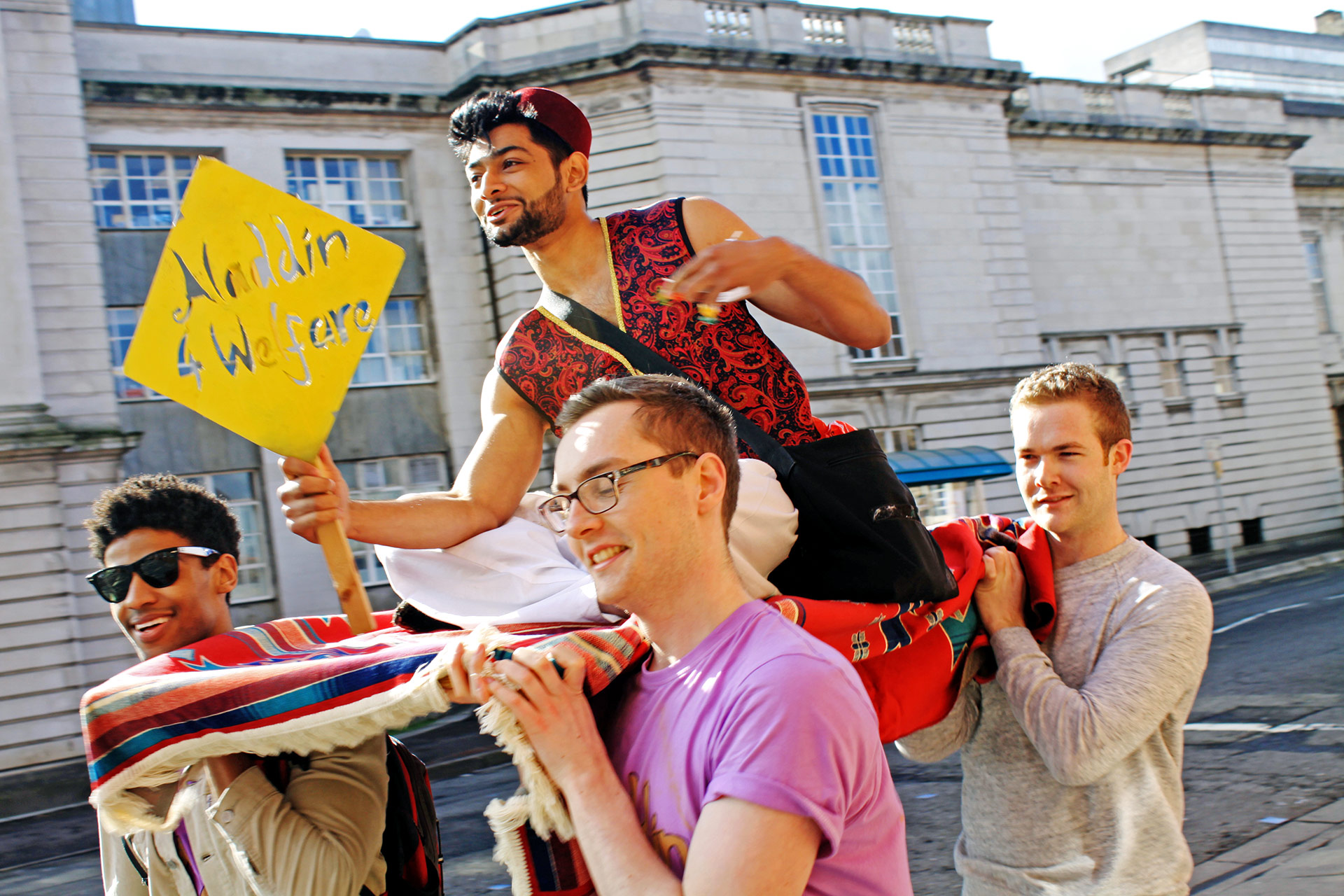Every year, Cardiff StudentÔÇÖs Union holds elections for a number of positions. Some of thee are part-time officers which represent the interests of certain student groups, but students also elect a team of fill-time sabbatical officers to fill six ÔÇ£Vice-PresidentÔÇØ positions, as well as President of the StudentÔÇÖs Union. To stand for election, you have to be a student at the time of elections, so itÔÇÖs OK if youÔÇÖre graduating this year and youÔÇÖd like to try your hand at leading the StudentÔÇÖs Union.
All of the Vice-PresidentÔÇÖs work from the third-floor office in the StudentÔÇÖs Union (alongside other administrators and directors), and are expected to work full-time. Part-time officers, on the other hand, conduct their positions alongside their studies, with nine different positions available. Nominations opened on Friday 28th November and close on Thursday 5th February, and the voting period is between 23rd-27th February. Any student is eligible to run include those who are part-time, international, mature and Heath-based.
What the positions involve
The full-time elected officer team (colloquially referred to as ÔÇÿSabbs.ÔÇÖ) is comprised of the Vice-Presidents of Welfare, Education, Sports and Athletic Union, Heath Park, Societies, and the StudentÔÇÖs Union President, who chairs the wider team. At AGM, a motion was passed to introduce a Postgraduate Students VP, which will commence alongside the new sabbatical officers this year, bringing the team up to a total of seven. During the meeting, a motion was also passed to remove the position of VP Media and Marketing.
The SU President acts as a key link to the UniversityÔÇÖs Vice Chancellor, Pro-Vice Chancellors, Council and Senate, as well as other organisations including NUS in Wales and the UK. They are also the chair of the Board of Directors and Trustees, and have significant responsibility for the financial standing and business performance of the SU.
In the last few years, SU Presidents have typically already spent a year as an elected officer of a different kind, so we asked the current SU President, Elliot Howells, whether that was essential for the role.
Do you have to be a sabb first to secure the role? ÔÇ£It is helpful, as with anything in life, but I wouldnÔÇÖt say itÔÇÖs essential. I think previous officers will often run because theyÔÇÖve worked closely with the SU President for that year and have a sound idea of the role and its responsibilities.ÔÇØ DonÔÇÖt be put off, then, if you want to shoot straight for the top.
So far, Elliot has introduced an app that gives students discounts to the outlets within the SU and organised trials for a University Challenge team.
The Welfare officer liaises between the Union and the University on non-academic issues relating to the student lifestyle and experience. This includes your housing, finance, mental and sexual health, safety and transport needs. The officer also works with stakeholders in the local community to ensure that students have a say in what happens in the student living areas of Cardiff and the city as a whole.
Faraz Alauddin, current Welfare Officer, has so far built upon the Safe Taxi Scheme with Dragon Taxis and is looking at implementing a substance awareness policy.
The Sports and Athletic Union President act to champion sports within the university and local community. Competitive and participation sports are represented within both the university and the union. As the key liaison officer with the University Sport Department, they also work with student led sports clubs to assist their development. Bryn Griffiths, the current Sports and AU President has already introduced a ÔÇÿSports Person of the WeekÔÇÖ award and has called for all Wednesday sports results to be published in Gair Rhydd.
The Education officer represents all students on academic issues. They negotiate with the university and encourage them to act your feedback. They also work to improve facilities, such as libraries and I.T. rooms, by conversing with the Information Services. The position also includes being the Chair of the College Forums and Academic Council, and being responsible for overseeing and promotion of the Student Academic Rep system. So far the current Education Officer, Rhys Jenkins, has worked with libraries to provide more electric sockets as well as improving the personal tutor system.
Of this role as Education Officer, Rhys says: ÔÇ£A lot of my job is in the University Meetings. It is in those meetings that we raise the student voice and advise the University on what students want. This does require a lot of knowledge about how the University works and about who can help you achieve what you want. This can obviously be learnt but it helps to already have some knowledge. I think your interests must be focussed around improving students experience at University. The role is challenging and there is always more that can be done. It also requires a lot of reading long and complicated papers, but it is necessary to achieve the improvements you want to make. If it was easy, it would already have been done, and the job would be pretty boring!ÔÇØ
The Heath Park Campus officer works to improve the healthcare student experience and all services at the Heath Park site. The current officer is Claire Blakeway, who told us about her role: ÔÇ£My role is to help and support students who are studying at the Heath Park Campus. I represent Heath students in everything from academic issues to getting students involved in sports clubs and societies. I guess the main aim of my role is to ensure that Heath students have the best experience possible whilst studying here at Cardiff University.
My day to day work includes representing Heath Park students on University committees, organising Heath Park activity as well as my director and trustee duties to the StudentsÔÇÖ union. ItÔÇÖs an incredibly busy job and I absolutely love it, I would thoroughly recommend anyone who is considering running for my role to go for it! ItÔÇÖs the best job ever!ÔÇØ
The Societies officer supports societies, campaigns and student led activity within the union, university and local community. They are responsible for allocating budgets and assigning tiers to over 180 societies as well as supporting and promoting student led services and campaign associations. Organising big union events also falls to the societies officer, including the Go Global Festival and Cardiff Fringe. They are the key liaison for all volunteering officers and support them to fulfil their manifesto pledges. Barney Willis, the current Societies Officer has created society forums and is working to make it easier for societies to book university rooms online. Of his position he says: ÔÇ£My job is to help and look after our societies! I am lucky enough to be the one that deals with committees directly to assist them any way they need. I am also here to help people who want to create or join societies themselves-get in touch if you have an idea and I will spread the word and help make it a reality.ÔÇØ
The Postgraduate StudentsÔÇÖ Officer is likely to take a similar form to some of the above roles, particularly Welfare and Education, but with a focus on postgraduate students. With over 7,000 postgraduate students currently involved at Cardiff University, the role seeks to better further the interests of a student group which are largely disengaged from the SU.
All candidates must have a manifesto ÔÇô a 200 word official statement from the candidate that sets out their experience, skills and goals and the reasons why the electorate should vote for that candidate. To nominate yourself for one of these positions, you have to apply through the StudentÔÇÖs Union website under the ÔÇÿYour VoiceÔÇÖ tab, and you can also suggest a nominee if you know someone who you feel would suit a particular role.
The application process is quite different to other jobs, says Elliot Howells: ÔÇ£As the roles are elected, thereÔÇÖs no application process as youÔÇÖd expect from your usual job. Students stand for election and then have to convince the student body that they are the right person for the job by campaigning and getting their name out there. It can be a tough week but is hugely rewarding. I often hear candidates say that as the election process progresses they realise how much they want the job even more! Even candidates that donÔÇÖt win often find it a fairly transformative experience as they have developed so many new skills and found new qualities in themselves. I met so many incredible people during both of my campaigns that have no become great friends.ÔÇØ
Once nominated, candidates work to promote themselves as the right person for the job by campaigning.
Elliot Howells, the current SU President gave his advice on campaigning: ÔÇ£Campaigning is what you make it! I guess my best advice would be to work out whatÔÇÖs going to work best for you. Are you the type of student that will happily speak in front of a lecture theatre of 300 students or would you rather stand on the street giving out leaflets? ThereÔÇÖs no formula for the perfect campaign, different things work for different people. Just think about you can best sell yourself.
Life as an officer is a big change from that of student life ÔÇô they are complex roles that require a certain level of skill. Elliot Howells told us about what he thinks it takes to become an officer: ÔÇ£ItÔÇÖs difficult to say as I donÔÇÖt think there is an ÔÇÿideal personÔÇÖ for the job. The exciting thing about these roles is that you can make them your own to a certain extent depending on what you want to achieve. Days and schedules often get extremely busy so itÔÇÖs useful if you can manage your time effectively and work to deadlines but even that can come with practice. If you have a passion for the student experience and want to make a difference, youÔÇÖre already most of the way there to being a great elected officer! If students are considering running and are worried about whether or not they have the right skills, my advice would be not to worry! The first summer of the role is full of training both internally and externally with colleagues from around the country.ÔÇØ
On life as an elected officer, Elliot said: ÔÇ£ItÔÇÖs safe to say that no day is the same! In addition to the remits of officers, Societies or Education for example, we are also Trustees and Directors of Cardiff University StudentsÔÇÖ Union so the range of work is huge. We are often in meetings representing the views of students across the University or in the community. The type of work that officers do varies depending on their remit and over the next few months, weÔÇÖll be publishing blogs about our roles and what to expect in them.ÔÇØ
Part-time Officers 
The part-time officers are unpaid roles to represent nine different liberation and minority groups within the student population. They are known as Campaign Officers, and Elliot Howells gave us an idea of what they get up to: ÔÇ£Our Campaign Officers are the group that represent typically underrepresented groups or causes on campus. They work with the full-time officers to run campaigning and social activity for the groups of students they represent. Unlike the full-time officers, this is a volunteer role that they carry out alongside their studies. The 13/14 Campaign Officer team is made up of a WomenÔÇÖs Officer, Students with DisabilitiesÔÇÖ Officer, Ethical & Environmental Officer, Welsh Language Officer, LGBT+ Officer, Mature StudentsÔÇÖ Officer, Postgraduate StudentsÔÇÖ Officer, BME Officer and an International StudentsÔÇÖ Officer.ÔÇØ
There is no doubt that all officer roles give the candidates transferrable skills that will help them beyond their time in office. As Elliot Howells has worked as the SU President for two years, he gives a good analysis of what qualities are gained: ÔÇ£The range of skills and experience you get in these roles is huge! All officers sit on the StudentsÔÇÖ UnionÔÇÖs Board of Trustees and Board of Directors and are involved in the highest level of decision-making. Officers will develop tangible experience in areas such as finance and HR but more broadly will have new skills such as negotiation, diplomacy, governance and a strong commercial awareness. Officers also complete a Level 5 qualification in leadership and management which is hugely beneficial for the future.ÔÇØ








Add Comment